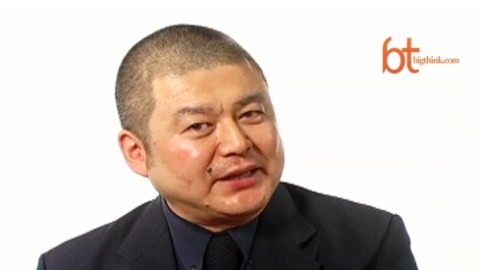The End of a Bold Experiment: Big Think and Satoshi Kanazawa

Thinking big involves taking risks, and taking risks requires a certain openness to failure. I believe it is an imperative to take such risks today because our personal welfare is directly tied to our ability to get smarter. The Information Industrial Complex (media and education), I believe, is increasingly missing the opportunity to save itself and better serve all of us. And so it is in the spirit of risk-taking that Big Think is always on the lookout for bold and clear voices, people who see the world through the lens of big ideas and who are able to express those ideas in a provocative, counterintuitive and poetic voice.
To that end, we have invited dozens of highly original bloggers to contribute to this site, and we continue to fill our studio with a steady stream of experts to share their wisdom in the form of video lessons.
It was in our studio, in fact, that I first became acquainted with Satoshi Kanazawa in 2010. Among the many key insights he delivered in his interview, Kanazawa introduced us to a proven mathematical theorem that explained why dating and finding a job in a large urban area is difficult and frustrating.
I thought this type of original, inspiring thinking would broadly resonate with our viewers and advance our core mission, and so I reached out to Kanazawa this past September to invite him to join Big Think as a blogger. At that time I anticipated that a range of criticism would likely emanate from the Big Think community, and emanate it did. After all, Kanazawa was a controversial choice, and his reputation certainly preceded his appearance on Big Think.
Kanazawa, an evolutionary psychologist at the London School of Economics, had recently parted ways withPsychology Today after there was widespread backlash against a post he had written that argued black women are physically less attractive than other women. Big Think’s editorial team was aware of these remarks, and we found them to be highly ill-advised. However, after a vigorous internal debate we concluded it was worth the risk to give Kanazawa a second chance and a second home to deliver the best of his work in the service of our cause.
Over the past few months, across various social media platforms, and also from the mouths of some of our own bloggers, I have listened to a sustained critique of Kanazawa’s presence on Big Think. Indeed I think it a testament to our commitment to intellectual openness that we allowed the discussion to play out on Big Think’s pages, in the form of blog posts, and on our social media platforms.
The most compelling arguments have cited numerous examples of faulty science in Kanazawa’s body of work, and the growing consensus in the evolutionary psychology community that his research is a poor representation of the field. This is particularly concerning given the fact that the core message of Kanazawa’s blog is that his work represents empirically correct science, and that his claims are unassailable on that basis.
After reviewing all the available evidence, and upon careful deliberation with the Big Think editorial team, I have decided that it would be best to discontinue our relationship with Kanazawa at this time.
What I hope results from this experience is what educators call a ‘teachable moment.’ We certainly believe in the value of free speech at Big Think, and give voice to controversial thinkers whose opinions tend to span the political spectrum and often challenge the sacred cows of their respective fields. Some of these thinkers, such as the Chinese contemporary artist and political dissident Ai Weiwei, express themselves at grave risk to their personal well-being. However, in providing a platform for dangerous ideas, we also run the risk of overreaching and losing the goodwill of our most dedicated readers. Our commitment is first, and always, to you, and to maintaining your trust and the level of intellectual integrity you expect from us, even while we push the boundaries.
In closing, I would like to highlight the fact that the way this dialogue has taken place — with readers and bloggers weighing in, the Big Think staff debating internally and then deciding on a prudent course of action — is a process that has been transparent, and is one that I am proud of. I would like to thank my colleagues and members of this community for their input. It was invaluable in guiding this decision.





